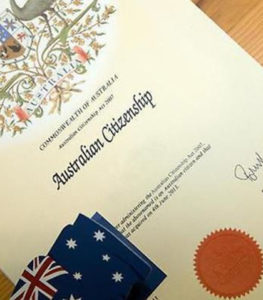Citizenship waiting times blow out – ANAO report
A backlog of 83,000 unprocessed citizenship applications has blown waiting times out for would be citizens by a factor of ten, according to a report by the Australian National Audit Office (ANAO).
Office (ANAO).
“Applications for citizenship by conferral have not been processed efficiently by the Department of Home Affairs,” the report said.
“Applications have not been processed in a time-efficient manner. Processing times have increased and long delays are evident between applications being lodged and decisions being taken on whether or not to confer citizenship. Significant periods of inactivity are evident for both complex and non-complex applications accepted by the department for processing,” it said.
“Applications have not been processed in a resource-efficient manner. The department has a suite of initiatives in train that are designed to improve efficiency but implementation has been slow.
“It has not set external key performance indicators to inform Parliament and other stakeholders of how efficient it has been in processing conferral applications. Further, the department is not checking the quality of the decisions being taken,” the ANAO report concluded.
When then prime minister Malcolm Turnbull announced new tougher measures for those applying for Australian citizenship in April 2017, the number of applications increased but weren’t processed as the department expected they were to be subject to the new laws that were yet to pass in Parliament.
The Applications received the week before the announcement generally took 30 days to be invited for a citizenship test, while applicants in the week afterwards took 290 days on average to be invited for a test, the ANAO found.
Just 15 per cent of applications for citizenship by conferral were within the government’s target time-frame of 80 days in 2017-18, and the target itself has since been removed, the report said.
While the number of applications has been steadily increasing, the rate of decisions has been declining, and hasn’t kept pace with the increase, the report found. The number of citizenship tests administered each year has also been going down.
The audit office found “increased integrity measures” introduced in 2017 were a significant driver in the increase in processing times from June 2017. The measures involved an increased checking process from “a national security and risk perspective”.
“While it was not the sole cause, the integrity screening process was a significant driver of the decrease in approvals throughout 2017–18 and consequently of the increased processing times and backlog of applications on hand,” the report said.
“There were 101,422 applications decided in 2017–18; the fewest since 2010–11.”
An internal review undertaken by Home Affairs late last year has identified more efficient ways to conduct the integrity screening.
Applications from people categorised as former illegal maritime arrivals also stalled from 2014-15 onwards, reaching a low in 2015-16, when just 137 applications for citizenship were approved and 5949 received.
Around 92 per cent of the citizenship applications lodged in 2017-18 were for citizenship by conferral, while other applications were by descent, adoption or resumption.
The audit office found that the overall complexity of applications had decreased, with the growth in demand for citizenship coming from skilled migrants with good documentation, although there has been an increase in the number of complex applications.
Home Affairs disagreed with a recommendation that externally reported key performance indicators be introduced and agreed in principle to address periods of inactivity in processing applications.













Leave a Comment